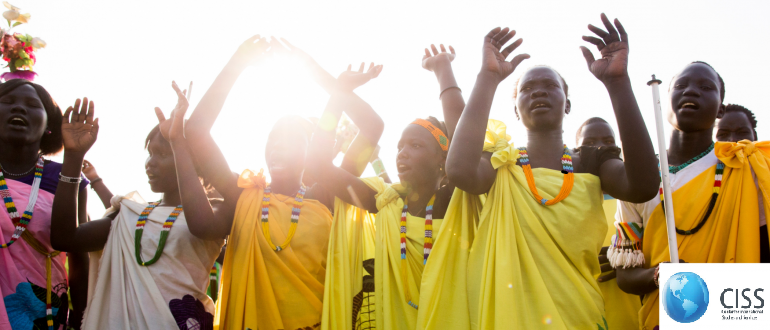
In Search for Safe Spaces: Women and Gender-Based Violence in South Sudan
As Africa’s youngest state, South Sudan has been torn apart by civil war and a colossal humanitarian emergency. Ethnopolitical tensions, economic deterioration, and insecurity have triggered vast displacement and amplified gender-based violence. Sexual abuse, such as genital mutilation, rape, and sexual slavery have become tools of combat exploited by conflicting parties who terrorise civilians. Shaped by sociocultural norms rooted in power inequality favouring patriarchal gender relations, gender violence remains the predominantly pronounced breach of human rights in this young country. The UN Mission in Juba recorded at least 21 rape, gang-rape, attempted rape, forced marriage, and sexual slavery cases between June and September 2020 including 10-year-old girls, a child with psychosocial disability, and 3 pregnant/lactating women as victims (HRW, 2021). Furthermore, living conditions for millions of South Sudanese keep deteriorating following periods of drought and famine while key institutions remain paralyzed and leave the population vulnerable.
Challenges ahead
Limited knowledge on what constitutes gender-based violence has resulted in the ingrained conformity of sexual violence as a “new normal”. The regularity of gender-based violence has made it ascribed to sociocultural practice currently e.g. rampant in refugee camps. A correlation thus exists between cultural norms and violence as manifested in the issue of child marriage which remains an acceptable practice in parts of the fragile state. Beliefs on gender roles and female servitude consequently influence customary practices like dowry payment encouraging child marriage.
Although the Child Act emphasises child protection from abuse, marriage and other negative and harmful cultural and social practices as articulated in section 22 and 23 (Ministry of Legal Affairs & Constitutional Development, 2009), child marriage is often regarded as a means of improving the family’s status in society. Material possession attached to the girl child is rooted in traditional customs of wealth transfer related to dowry payment. However, despite existing regulations, cases of young girls being preyed on have escalated. The gang-rape of a girl eight years of age who was dragged out from her house as the mother was held at gunpoint in Juba’s Gudele area is just an example of what some girls encounter regularly (Mary, 2020).
Juba’s legal system prioritizes formal law in determining criminal proceedings but the weak and ineffective justice system has paved way for customary courts. With 64 ethnic groups in South Sudan, each group has its own customary law system. Despite various systematic differences, the great commonality is exhibited especially regarding how women are viewed. Some features of customary law are normally at odds with women’s rights and thus the clash of women’s rights in customary law and international human rights law. Apart from dictating a woman’s access to resources and personal security, customary law also upholds harmful practices that degrade a woman’s status. As set forth in the the2005 Comprehensive Peace Agreement (Naivasha Agreement) and Interim Constitution, customary law is legally binding. The proclamation has a significant influence on decisions made by SGBV survivors who opt to suffer in silence and consider this as the best option since the system fails to recognize women’s issues and rights.
Although customary law is a major setback on women’s rights due to its undermining nature, it is extensively utilized at the local level. Customarily old men who have no formal legal grounding act as traditional authorities who oversee the customary courts. With this power at hand, they botch the concept of fair play by upholding patriarchal views and pronouncing biased judgements favouring one gender. Nonetheless, formal and traditional justice systems consider gender-based violence specifically child marriages and intimate partner violence (IPV) a social problem resolvable at the family or community level and thus not regarded as a violation of a woman’s or girl’s right to security (IOM, 2019).
Tasked with the implementation of law enforcement, the National Police Service remains short-staffed, underfunded, tinted by impunity and lacking proper training on the know-how of handling gender-related cases. Not only are they not conversant with women’s rights, but they also occasionally arrest rape survivors for adultery or detain them as a form of security measure until the culprit is apprehend (IOM, 2019).
Societal reaction mirrors the prevalent shame and blame culture surrounding gender violence in South Sudan and one that suppresses SGBV survivors from coming forward to get assistance. Entrenched social norms act as barriers to survivors due to limitations brought forth on women’s peer support initiatives. Survivors are also not spared from being judged and blamed for initiating the endured abuse. In addition to this blame game, the type of violence experienced determines the sort of shame and stigma directed towards the victim. For instance, sexual violence on an unmarried woman affects the family’s social status in the community and breeds fear that stepping out of the family circle in search of assistance will damage the woman’s chances of securing a husband. This will in turn interfere with the anticipated economic assets brought about by dowry payment hence the reluctance in speaking out. Women also fear that reporting sexual violence will result in them forcefully getting married to their rapists as agreed upon by the traditional authority and family unit.
In terms of responsibilities, men (especially married men as per the traditional sense) engage in the public sphere whereas women focus on domestic activities despite the history of female elders and spiritual and political leaders in the community (CSRF, n.d.). To date, this traditional division of labor is still entrenched in society. Young men are expected to display their masculinity by protecting their families, communities and livestock which at times corresponds to structured violence. Men are therefore considered to be the engine of economic, livelihood, and security matters while women are restricted to domestic labor. Thus, success in the protection and also in warfare elevate the social status of male youth (CSRF).
Women whose husbands get entangled in conflict often become heads of the household and main breadwinners. This amplifies the decision-making power of women but still holds them captive to their traditional obligation of time-intensive domestic activities. The dynamics of women’s roles tend to cause tension especially during the past civil war where some male refugees and IDPs who were unable to secure employment battled to grapple that their wives had become the principal breadwinners and this accounted for the escalation in GBV (CSRF).
The Covid-19 pandemic has aggravated existing sexual exploitation with increasing harassment and rape cases. Implementation of sanitary restrictions has worsened the situation since young girls have fallen victim to prostitution and early pregnancies with at least 1,535 girls in the Equatoria region going through child marriage, forced prostitution or pregnancies (HRW, 2021). Pandemic-associated risks have also escalated gender-related abuse fuelled by the loss of livelihood, food insecurity, displacement, and heightened levels of insecurity. Food scarcity has exposed women and girls making them easy prey since they travel outside their safety parameters in quest of firewood, food, and water thereby increasing their susceptibility to GBV.
As further sanitary restrictions and lockdowns seem inevitable, an upsurge in SGBV is likely weakening women’s opportunities to seek safe spaces as they are isolated alongside their abusers and any available support system is halted. Further marginalization and tighter budgets will induce donor fatigue so that resources will be diverted to sustain Covid-19 programmes. As a consequence, women’s marginalization in South Sudan is at its peak and pursuit for redemption lies in limbo.
Conclusion
South Sudan’s soaring levels of gender-based violence against women clearly indicate that their rights are botched concepts in need of defense. The traditionally patriarchal element manifested in the South Sudanese society has a significant effect on gender relations as it diminishes the influence of women in shaping decisions since men are enshrined as the household heads and main decision-makers whereas women are expected to be submissive. Additionally, women, especially those living in remote areas, who have limited or no formal education continue experiencing unequal gender relations since formal legislative requirements are not necessarily practiced as the customary law continues being a source of gender inequality.
Sociocultural beliefs that pay homage to bridal wealth and child marriage are the root cause of violence and thus a clarion call to stakeholders to address these setbacks. Last but not least, designing local-level policy interventions while trying to include traditional structures, rather than imposing Western assumptions should also be taken into consideration.
References
CSRF South Sudan. Gender CSRF Gender in South Sudan Research Repository Guide.
El-Bushra, J., & Gardner, J. (2016). The impact of war on Somali men: feminist analysis of masculinities and gender relations in a fragile context. Gender and Development, 24(3), 443–458.
Devon, C. (2019). Still in Danger: Women and girls face sexual violence in South Sudan despite peace deal. Refugees International.
Human Rights Watch. (2021). South Sudan Events of 2020. https://www.hrw.org/world-report/2021/country-chapters/south-sudan.
International Organization for Migration (IOM). (2019). Gender-based violence knowledge, attitudes and practices survey in South Sudan. International Organization for Migration. https://publications.iom.int/system/files/pdf/south-sudan-gender-based-kap.pdf .
Mary, R. (2020, May 10). Child gang-raped, found unconscious in Juba. Eye Radio. https://eyeradio.org/child-gang-raped-found-unconscious-in-juba/
Ministry Legal Affairs and Constitutional (2009, February 10). The Child Act, 2008 Southern Sudan Gazette No. 1 Volume. https://www.ilo.org/dyn/natlex/docs/ELECTRONIC/83470/92194/F822057232/SDN83470.pdf.
Saferworld. (2020, July 20). “It is like another war”: confronting gender-based violence amid COVID-19 in South Sudan. https://www.saferworld.org.uk/resources/news-and-analysis/post/887-ait-is-like-another-wara-confronting-gender-based-violence-amid-covid-19-in-south-sudan.

Marion Esm'eralda
Marion Esm’eralda is an honors graduate from the Higher School of Economics where she majored in Public Policy and developed an interest in anti-corruption policy. Prior, Marion graduated with a Bachelor’s degree in International Diplomacy and Disaster Management where she specialized in peace and conflict studies. During and after her bachelors’ programme, she partnered and volunteered with various organizations like the African Medical and Research Foundation (Amref) and the Red Cross Society. She has also been part of girl child initiatives and non-communicable diseases campaigns.
